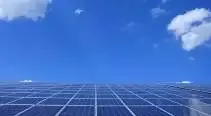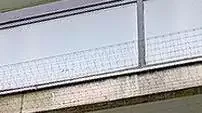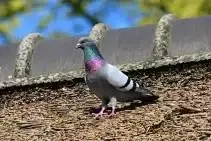Address
A & H Pest Control
The Berries
Yester Rd
BR7 5LT
020 8295 3402
Address
A & H Pest Control
The Berries
Yester Rd
BR7 5LT
020 8295 3402
Solar Panel Bird Proofing St Albans call A & H Pest Control on 020 8295 3402 or use our simple online contact form. Our experienced independently 5 star Pigeon Control St Albans Team can assist you with any Commercial Anti Bird Netting St Albans requirements, so please do not hesitate to contact our team on 020 8295 3402.
 In recent decades, solar panels have become widespread across residences and commercial properties in the UK. With renewable energy on the rise and UK incentives in play, solar setups are hailed as earth-friendly and wallet-wise. Still, a growing issue confronts owners: pigeons nesting under their solar setups.
In recent decades, solar panels have become widespread across residences and commercial properties in the UK. With renewable energy on the rise and UK incentives in play, solar setups are hailed as earth-friendly and wallet-wise. Still, a growing issue confronts owners: pigeons nesting under their solar setups.
Although solar panels are effective in generating renewable energy, they have unintentionally become a perfect environment for pigeons, creating several issues. These birds are drawn to the warmth, protection, and shelter that solar panels provide, which, while beneficial to the pigeons, brings about significant problems for the owners of solar panel systems. The issue has raised concerns, from damage to the solar panels to the health risks posed by pigeons.
The main draw for pigeons is the cosy, warm space beneath solar panels. High atop buildings, solar panels craft a concealed, guarded spot for pigeon roosts. The heat from panels, especially in winter, makes these spots extra appealing. Similar to other birds, pigeons seek cosy, covered spots to rest in winter. Panels offer a cushy, secure perch away from foes and harsh weather.
On top of heat and cover, the space under panels is perfect for nests. Urban-based pigeons have few organic nesting choices. Under-panel areas, hidden and protected, hit the mark, spurring nest increases. Hence, these areas frequently overflow with nests of twigs, feathers, and junk.
The Effects of Pigeons on Solar Panels The damage caused by pigeons nesting under solar panels is one of the most significant concerns for property owners. The highly acidic droppings of pigeons can corrode solar panels, damaging their surfaces over time. The build-up of droppings beneath solar panels can corrode the wiring and metal, which reduces the overall efficiency of the system. With the increasing build-up of waste, the potential for long-term damage to the panels grows.
The acidic nature of pigeon droppings can cause significant damage to solar panels. Over time, pigeon droppings can corrode the surface of solar panels, causing them to lose efficiency and incur repair costs. As the waste accumulates, it can obstruct the panels, reducing their ability to capture sunlight and diminishing their energy output.
 Besides the physical damage, pigeons under solar panels also pose a health risk. Pigeons are known to carry various diseases, including Salmonella and E. coli, which can be passed on through their droppings. The droppings can become a breeding ground for dangerous bacteria, jeopardizing public health.
Besides the physical damage, pigeons under solar panels also pose a health risk. Pigeons are known to carry various diseases, including Salmonella and E. coli, which can be passed on through their droppings. The droppings can become a breeding ground for dangerous bacteria, jeopardizing public health.
The chief issue is diseases passing via droppings. Once dry, droppings launch germs skyward, endangering breathing if taken in. Brushing droppings or inhaling their grit can disease people. The danger spikes for the elderly, immune-weak, or those with asthma.
Guano stacks draw mites and fleas too, worsening health risks. The pests can share germs or pester humans, especially indoors. So, pigeons plus droppings hit property and occupant health.
This pigeon problem under panels is tough, though prevention works. Leading methods seal off space or spook pigeons from day one.
Fixing Netting or Mesh In Place: The best move is mesh or netting on panel sides to keep pigeons out. It locks out the bottom area, stopping pigeon nests. Hardy and rain-resistant, this mesh gives a permanent stop.
Pigeon Spikes: Spikes on panel rims or perch points are another solid choice. This throws off settling, driving pigeons elsewhere. Spikes won’t always halt nests if built.
Maintaining solar panels by cleaning beneath them regularly is crucial to preventing pigeon infestations. Removing debris and nesting materials from beneath the panels helps deter pigeons from returning. For more persistent problems, property owners may want to consult professional pigeon control services.
Specialist Pigeon Control: Persistent bird woes? Call in specialists. They assess and launch solutions, from shields to nest yanks. Specialists secure lasting pigeon bans.
 Many solar panel manufacturers in the United Kingdom use effective techniques to bird proof their panels to improve the efficiency and productivity. It will also prevent unnecessary damages to these panels. A mesh system is used over the solar panels to protect them from birds and bird droppings. All birds, insects and bird droppings are kept away through these meshing systems. The mesh systems are usually invisible from the ground level. Your roof will not be screwed or drilled for this purpose. The mesh is secured with a special type of clip which will not damage the panel. This is why you need not worry about the mesh system that is in place to protect the solar panels. The mesh system will not interfere with the warranty of the solar panels. In fact, the warranty of the panels will not be affected in any way by the mesh system installed. These are some of the major considerations when bird proofing your solar panels right now. It will help improve the energy efficiency and save your money in the long run. The aforementioned article provides an overview of the importance of bird proofing your solar panels.
Many solar panel manufacturers in the United Kingdom use effective techniques to bird proof their panels to improve the efficiency and productivity. It will also prevent unnecessary damages to these panels. A mesh system is used over the solar panels to protect them from birds and bird droppings. All birds, insects and bird droppings are kept away through these meshing systems. The mesh systems are usually invisible from the ground level. Your roof will not be screwed or drilled for this purpose. The mesh is secured with a special type of clip which will not damage the panel. This is why you need not worry about the mesh system that is in place to protect the solar panels. The mesh system will not interfere with the warranty of the solar panels. In fact, the warranty of the panels will not be affected in any way by the mesh system installed. These are some of the major considerations when bird proofing your solar panels right now. It will help improve the energy efficiency and save your money in the long run. The aforementioned article provides an overview of the importance of bird proofing your solar panels.